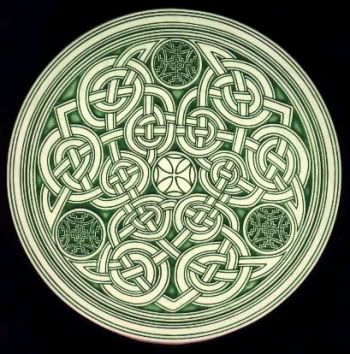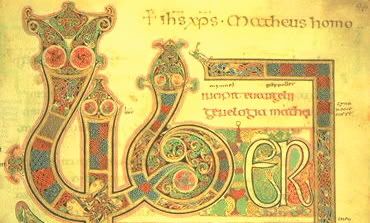
Who isn't a little bit Irish on St Paddy's day? My own surname is supposed to be Scotch-Irish (i.e., kicked out of both countries). Matkin means "little Matthew" or "Matthew's kin."
Glorious St Patrick (c. 390-461) was a Briton and son of a deacon, captured by pirates at the age of sixteen, taken to Ireland, and forced to work as a shepherd. Six years later, he returned to the mainland and became a priest in a monastery. He eventually returned to Ireland as the first missionary bishop since St Paul the Apostle. His use of the shamrock to explain the Trinity to the Irish is the stuff of legend. (He was also said to have driven snakes off the island, perhaps a reference to driving out native Druidism.)
According to the delightful book How the Irish Saved Civilization by Thomas Cahill, the Celtic Church of Ireland played a critical role in the preservation of learning through the collapse of the old Roman Empire. Here are some excerpts:
Like the Jews before them, the Irish enshrined literacy as their central religious act. . . . Ireland, at peace and fiercely copying, thus stood in the position of becoming Europe's publisher. But the pagan Saxon settlements of southern England hat cut Ireland off from easy commerce with the continent. While Rome and its ancient empire faded from memory and a new, illiterate Europe rose on its ruins, a virbant, literary culture was blooming in secret along its Celtic fringe. . . .
Latin literature would almost certainly have been lost without the Irish, and illiterate Europe would hardly have developed its great national literatures without the example of the Irish, the first vernacular literature to be written down. Beyond that, there would have perished in the west not only literacy, but all the habits of mind that encourage thought. And when Islam began its medieval expansion, it would have encountered scant resistance to its plans--just scattered tribes of animists, ready for a new identity. . . .
By this point [the establishment of Irish missions throughout Europe by c. 870], the transmission of European civilization was assured. Wherever they went, the Irish brought with them their books, many unseen in Europe for centuries and tied to their waists as signs of triumph, just as Irish heroes had once tied to their waists their enemies' heads. Wherever they went they brought their love of learning and their skills in bookmaking. In the bays and valleys of their exile, they reestablished literacy and breathed new life into the exhausted literary culture of Europe.
And that is how the Irish saved civilization.


It is also worth noting that the Irish Church influenced the development of Christianity. With no cities and a church dominated by rural monasteries, the pastoral and monastic tradition in Ireland was very strong. It is from this that we got the sense of the parish as a family, calling the priests "father", and the practice of private sacramental confession.
ReplyDelete